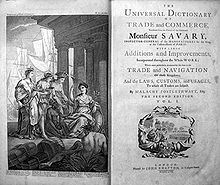- Malachy Postlethwayt
-
Malachy Postlethwayt (1707? – 1767) was a British commercial expert famous for his publication of the commercial dictionary titled The Universal Dictionary of Trade and Commerce in 1757. The dictionary was a translation and adaptation of the Dictionnaire économique of the French Inspector General of the Manufactures for the King, Jacques Savary des Brûlons.[1]
Contents
Life
Born about 1707, Postlethwayt was elected a Fellow of the Society of Antiquaries of London on 21 March 1734.[2] From some time in the 1730s he worked for the Royal Africa Company, and wrote in its defence.[3]
He died suddenly, on 13 September 1767, and was buried in Old Street churchyard, Clerkenwell.[2]
Works
He devoted twenty years to the preparation of ‘The Universal Dictionary of Trade and Commerce,’ London, 1751 (3rd edit. London, 1766; 4th edit. London, 1774), a translation, with large additions, from the French of J. Savary des Brulons. Postlethwayt collected information, freely plagiarising other writers, but presented his results haphazardly.[2]
Postlethwayt also published:
- ‘The African Trade the great Pillar and Support of the British Plantation Trade in America,’ &c., 1745.
- ‘The Natural and Private Advantages of the African Trade considered,’ &c., 1746.
- ‘Considerations on the making of Bar Iron with Pitt or Sea Coal Fire, &c. In a Letter to a Member of the House of Commons,’ London, 1747.
- ‘Considerations on the Revival of the Royal-British Assiento, between his Catholic Majesty and the … South-Sea Company. With an … attempt to unite the African-Trade to that of the South-Sea Company, by Act of Parliament,’ London, 1749.
- ‘The Merchant's Public Counting House, or New Mercantile Institution,’ &c., London, 1750.
- ‘A Short State of the Progress of the French Trade and Navigation,’ &c., London, 1756.
- ‘Great Britain's True System. … To which is prefixed an Introduction relative to the Forming a New Plan of British Politicks with respect to our Foreign Affairs,’ &c., London, 1757.
- ‘Britain's Commercial Interest explained and improved, in a Series of Dissertations on several important Branches of her Trade and Police. … Also … the Advantages which would accrue … from an Union with Ireland,’ 2 vols., London, 1757; 2nd edit., ‘With … a clear View of the State of our Plantations in America,’ &c., London, 1759.
- ‘In Honour to the Administration. The importance of the African Expedition considered,’ &c., London, 1758.[2]
Eric Williams cited the work of Postlethwayt on the slave trade in his Capitalism and Slavery (1944).[4]
Notes
- ^ Adam Smith Review Volume 4 by Vivienne Brown p.196
- ^ a b c d
 "Postlethwayt, Malachy". Dictionary of National Biography. London: Smith, Elder & Co. 1885–1900.
"Postlethwayt, Malachy". Dictionary of National Biography. London: Smith, Elder & Co. 1885–1900. - ^ Christopher Leslie Brown, Moral Capital: foundations of British abolitionism (2006), p. 270;Google Books.
- ^ Groenewegen, Peter, "Postlethwayt, Malachy", on the website of the Oxford Dictionary of National Biography (Subscription or UK public library membership required), http://dx.doi.org/10.1093/ref:odnb/22599
External links
- Attribution
 This article incorporates text from a publication now in the public domain: "Postlethwayt, Malachy". Dictionary of National Biography. London: Smith, Elder & Co. 1885–1900.
This article incorporates text from a publication now in the public domain: "Postlethwayt, Malachy". Dictionary of National Biography. London: Smith, Elder & Co. 1885–1900.
This article about a non-fiction writer from the United Kingdom or one of its constituent countries is a stub. You can help Wikipedia by expanding it.


